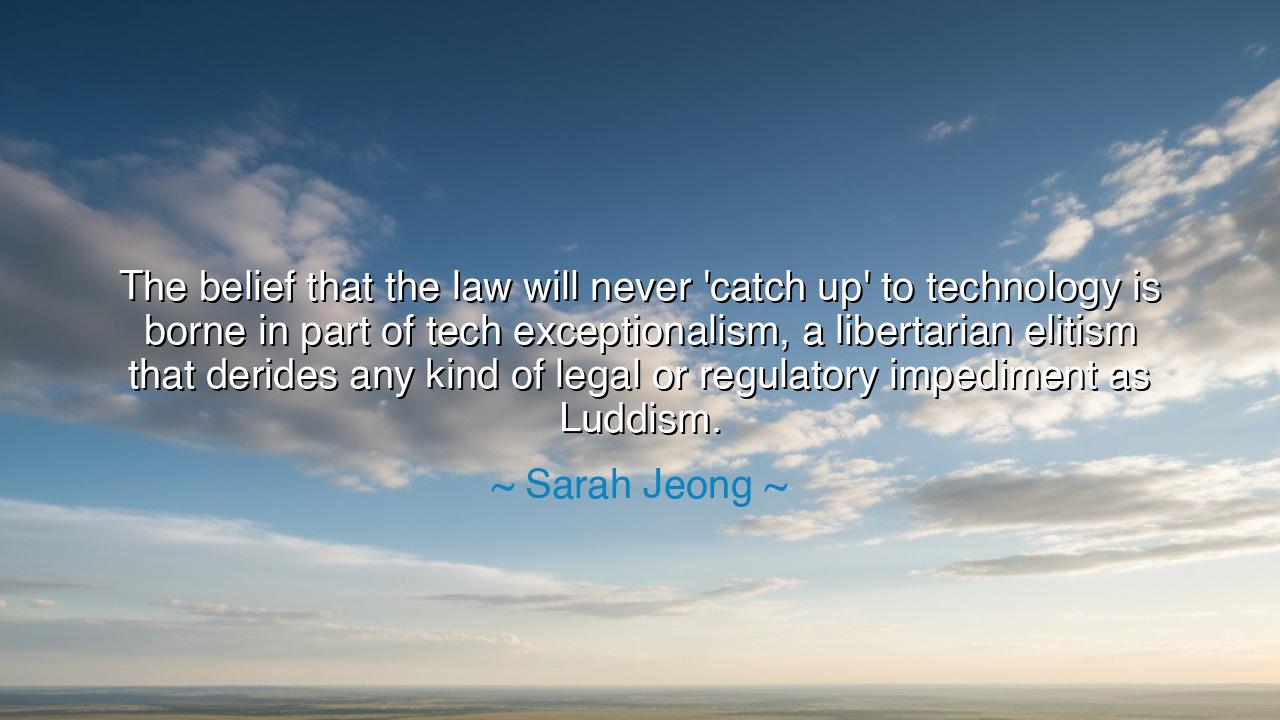
The belief that the law will never 'catch up' to technology is
The belief that the law will never 'catch up' to technology is borne in part of tech exceptionalism, a libertarian elitism that derides any kind of legal or regulatory impediment as Luddism.






"The belief that the law will never 'catch up' to technology is borne in part of tech exceptionalism, a libertarian elitism that derides any kind of legal or regulatory impediment as Luddism." Thus spoke Sarah Jeong, chronicler of the digital age, who has walked the tangled pathways where code and law collide. Her words pierce like arrows, aimed at the arrogance of those who believe that technology stands above society, untouchable by the rules that bind all else. She reminds us that law and technology are not eternal enemies, but companions that must be guided together, lest innovation devour the very world it seeks to improve.
The origin of this wisdom lies in the recurring myth of tech exceptionalism: the belief that technology is so fast, so transcendent, that no human system—least of all the slow grind of legal doctrine—can contain it. Those who embrace this myth often clothe themselves in the robes of revolution, dismissing regulators as fools and calling any attempt at restraint "Luddism," as though caution were nothing but fear of progress. Yet Jeong unmasks this conceit: it is not progress, but elitism, when the powerful wield new tools without accountability, while the rest of humanity is left to bear the consequences.
History provides a vivid illustration. In the early 20th century, the automobile burst upon society like a force of nature. At first, there were few rules: no traffic lights, no speed limits, no licenses. The result was chaos—streets filled with accidents, deaths rising each year. Some argued that the law could never keep pace with the speed of the car. Yet laws did come: traffic codes, licensing, safety standards. The automobile was not diminished by them; it was made safer, more reliable, more universal. So too with technology today: to dismiss regulation as futile is to forget that law has always caught up, sometimes slowly, but always necessarily.
Jeong’s words also remind us that the cry of "Luddism" is often a weapon used by the powerful against the weak. The original Luddites were not mindless destroyers of machines; they were skilled workers resisting exploitation by factory owners who used machines to devalue their labor. To equate every call for restraint with "Luddism" is to silence the voices of those who seek fairness in the face of disruption. It is a way of mocking justice, painting defenders of the vulnerable as enemies of progress. In truth, progress without justice is no progress at all—it is merely domination by another name.
The heroism in Jeong’s insight lies in her call for balance. She does not deny the power of technology, nor the need for innovation. But she warns against libertarian elitism—the philosophy that glorifies absolute freedom for inventors and corporations while ignoring the chains it forges upon ordinary people. Law, though imperfect, is the means by which society declares that technology must serve humanity, not rule it. To cast aside this balance is to risk a future where the machine is sovereign, and the human merely its subject.
The lesson for us is profound: do not be seduced by the myth that the law cannot keep pace. The law may be slow, but slowness is not weakness; it is deliberation, it is wisdom, it is the weight of collective judgment. The law has bent railroads, automobiles, electricity, medicine, and communication into forms that serve life rather than destroy it. Technology without law is fire unbound—bright but dangerous. Law without technology is stagnation—stable but brittle. Together, they create order and growth.
What practical steps must we take? Support the crafting of legal frameworks that protect privacy, safety, and fairness in the digital age. Demand accountability from the creators of powerful technologies, ensuring that innovation does not trample the dignity of the many for the profit of the few. And perhaps most importantly, reject the scornful dismissal of those who question technology’s impact—remembering that skepticism is not fear, but wisdom.
So let Sarah Jeong’s words endure: technology is not beyond law, and law is not the enemy of progress. Beware the arrogance of tech exceptionalism, for it tempts us to bow before machines as idols. Instead, let us forge a future where law and technology walk together—not in conflict, but in harmony—so that progress may be both brilliant and just.






AAdministratorAdministrator
Welcome, honored guests. Please leave a comment, we will respond soon